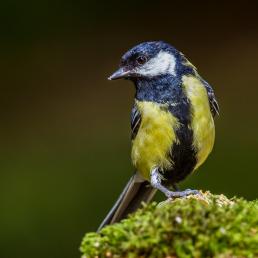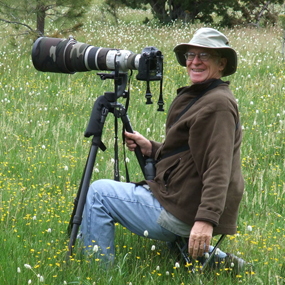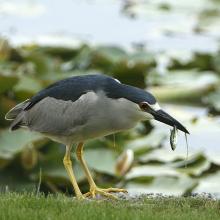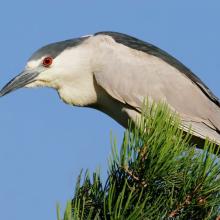

Join BirdNote tomorrow, November 30th!
Illustrator David Sibley and actor H. Jon Benjamin will face off in the bird illustration battle of the century during BirdNote's Year-end Celebration and Auction!
Black-crowned Night-Herons feed primarily on fish, but they will consume everything from earthworms to clams to eggs of nesting birds and refuse at landfills! Because they are high on the food chain, found throughout much of the world, and nest in colonies, Black-crowned Night-Herons can tell us a lot about the health of our environment.
BirdNote®
The Far-flung Black-crowned Night-Heron
Written by Bob Sundstrom
This is BirdNote.
[Marsh soundscape with insects and frogs calling]
The sight of herons standing in a marsh, stabbing at prey in the shallows, is familiar in many places. But a few heron species shun the daylight to hunt their prey by night. One of these nocturnal specialists, the Black-crowned Night-Heron, is found across much of the US.
[Black-crowned Night-Heron calls]
It also inhabits all the continents except Australia and Antarctica. It’s even found in island groups as remote as Hawaii, making the Black-crowned Night-Heron the most widespread heron on earth.
Such a far-flung range suggests highly successful adaptation. Feeding at night, Black-crowned Night-Herons are freed from competing with the more numerous day-hunting herons. They are also very opportunistic feeders. While fish are often primary prey, the herons will consume everything from earthworms to clams to eggs of nesting birds and refuse at landfills. They also have a flexibly long breeding season, which may enable them to thrive across such a broad geographic range.
[Black-crowned Night-Heron calls]
Since they are high on the food chain, found over much of the world, and nest in colonies, Black-crowned Night-Herons can tell us a great deal about the health — or contamination — of our environment.
For BirdNote, I'm Michael Stein.
###
Bird sounds provided by The Macaulay Library of Natural Sounds at the Cornell Lab of Ornithology, Ithaca, New York. Black-crowned Night-Heron 136200 recorded by Martha J Fischer.
Riparian Zone Night Insects (Nature Sounds 120) recorded by Gordon Hempton.
BirdNote's theme music was composed and played by Nancy Rumbel and John Kessler.
Producer: John Kessler
Executive Producer: Dominic Black
© 2015 Tune In to Nature.org October 2014/2017/2019/2021 Narrator: Michael Stein
ID# BCNH-01-2014-10-07 BCNH-01
Source noting long breeding season adaptation: http://mnfi.anr.msu.edu/abstracts/zoology/nycticorax_nycticorax.pdf







